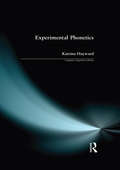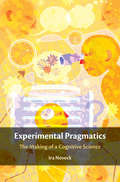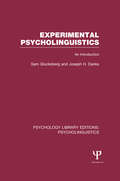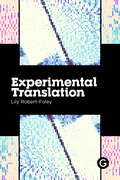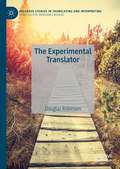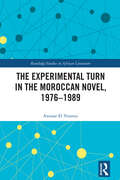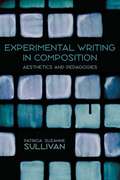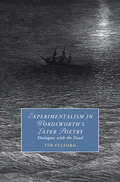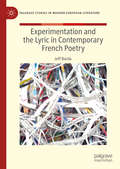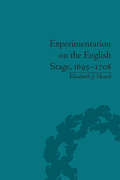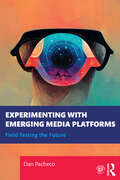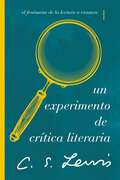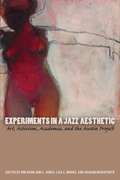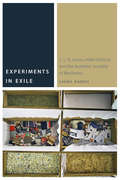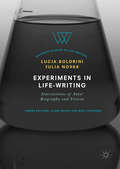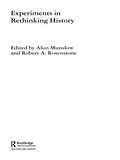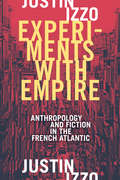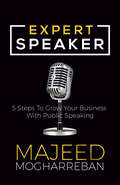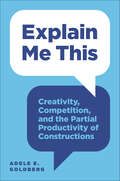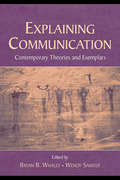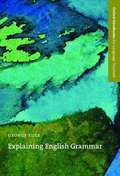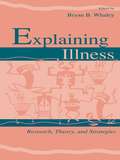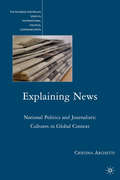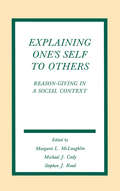- Table View
- List View
Experimental Phonetics: An Introduction (Longman Linguistics Library)
by Katrina HaywardFirst published in 2000. Routledge is an imprint of Taylor & Francis, an informa company.
Experimental Pragmatics: The Making of a Cognitive Science (Palgrave Studies In Pragmatics, Language And Cognition Ser.)
by Ira NoveckHow does a listener understand a sarcastic 'That was a wonderful speech' when the words point to a positive review? Why do students of introductory logic interpret 'Some cabs are yellow' as 'Not all cabs are yellow' when the meaning of 'some' is compatible with 'all'? Pragmatics aims to explain how listeners draw out a speaker's meaning from utterances, an astonishing feat when one considers that the words in a sentence hardly suffice for fully comprehending what the speaker intended. Given the nature of pragmatics, it is going to take the interdisciplinary firepower of many cognitive sciences - including philosophy, experimental psychology, linguistics and neuroscience - to fully appreciate this uniquely human ability. In this book, Ira Noveck, a leading pioneer in experimental pragmatics, engagingly walks the reader through the phenomena, the theoretical debates, the experiments as well as the historical development of this growing academic discipline.
Experimental Psycholinguistics: An Introduction (Psychology Library Editions: Psycholinguistics)
by Sam Glucksberg Joseph H. DanksHow is speech produced and understood in the context of everyday communication? First published in 1975, this book is considered one the best of the early books in this field. The task of psycholinguistics is to discover how people produce and comprehend speech. This encompasses virtually all aspects of psychology, including perceptual, conceptual, and social processes. The authors tried to capture the flavour of this approach to the psychology of language by describing the major contemporary issues, problems, and phenomena, of the time, being dealt with in laboratories and in field studies, and by trying to make sense of the data they had. Experimental Psycholinguistics: An Introduction does not try to deal exhaustively with any one issue in linguistics or in psychology. Rather it tries to integrate the authors’ knowledge of language and language behaviour so that someone entering the field has an intelligible framework with which to start.
Experimental Syntax and Island Effects
by Jon Sprouse Norbert HornsteinThis volume brings together cutting-edge experimental research from leaders in the fields of linguistics and psycholinguistics to explore the nature of a phenomenon that has long been central to syntactic theory – 'island effects'. The chapters in this volume draw upon recent methodological advances in experimental methods in syntax, also known as 'experimental syntax', to investigate the underlying cognitive mechanisms that give rise to island effects. This volume presents a comprehensive empirical review of a contemporary debate in the field by including contributions from researchers representing a variety of points of view on the nature of island effects. This book is ideal for students and researchers interested in cutting-edge experimental techniques in linguistics, psycholinguistics and psychology.
Experimental Translation: The Work of Translation in the Age of Algorithmic Production (Practice as Research)
by Lily Robert-FoleyThe history and future of an alternative, oppositional translation practice.The threat of machine translation has given way to an alternative, experimental practice of translation that reflects upon and hijacks traditional paradigms. In much the same way that photography initiated a break in artistic practices with the threat of an absolute fidelity to the real, machine translation has paradoxically liberated human translators to err, to diverge, to tamper with the original, blurring creation and imitation with cyborg collage and appropriation. Seven chapters reimagine seven classic &“procedures&” of translation theory and pedagogy: borrowing, calque, literal translation, transposition, modulation, equivalence, and adaptation, updating them for the material political and poetic concerns of the contemporary era. Each chapter combines reflections from translation studies and experimental literature with practical guides, sets of experimental translation &“procedures&” to try at home or abroad, in the classroom, the laboratory, the garden, the dance hall, the city, the kitchen, the library, the shopping center, the supermarket, the train, the bus, the airplane, the post office, on the radio, on your phone, on your computer, and on the internet.
The Experimental Translator (Palgrave Studies in Translating and Interpreting)
by Douglas RobinsonThis book celebrates experimental translation, taking a series of exploratory looks at the hypercyborg translator, the collage translator, the smuggler translator, and the heteronymous translator. The idea isn’t to legislate traditional translations out of existence, or to “win” some kind of literary competition with the source text, but an exuberant participation in literary creativity. Turns out there are other things you can do with a great written work, and there is considerable pleasure to be had from both the doing and the reading of such things. This book will be of interest to literary translation studies researchers, as well as scholars and practitioners of experimental creative writing and avant-garde art, postgraduate translation students and professional (literary) translators.
The Experimental Turn in the Moroccan Novel, 1976-1989 (Routledge Studies in African Literature)
by Anouar El YounssiThe Experimental Turn in the Moroccan Novel, 1976-1989 examines the trajectory of the Moroccan experimental novel and makes a link between its emergence in the early-mid 1970s and the Arab defeat in the six-day war with Israel in 1967.Drawing on works by Muḥammad Barrādah, ʿAbdullāh al-ʿArwī, Aḥmad al-Madīnī, and others, the book contends that the Moroccan experimental novel reflects an historic turning point and transitional cultural landscape. It further shows that the experimental novel laid the ground for a different vision of literature, an important feature of which was the intent to surpass the traditional realist model as executed by Moroccan novelist ʿAbdulkarīm Ghallāb (1919–2017) and Egyptian Nobel laureate Najīb Maḥfūẓ (1911–2006). This new vision of literature seeks to create new discursive spheres for the treatment of the social and the political.This book will be an important contribution to debates around Moroccan/Arabic/Maghrebi literature, as well as to the field of literary experimentalism more broadly.
Experimental Writing in Composition: Aesthetics and Pedagogies
by Patricia Suzanne SullivanSullivan unpacks the work of major scholars in composition and rhetoric and their theories on aesthetics, particularly avant-gardism. She also relates the dialectics that shape these aesthetics and sheds new light on both the positive and negative aspects of experimental writing and its attempts to redefine the writing disciplines. Additionally, she shows how current debates over the value of multimedia texts echo earlier arguments that pitted experimental writing against traditional models. Sullivan further articulates the ways that multimedia is and isn’t changing composition pedagogies, and provides insights into resolving these tensions.
Experimentalism in Wordsworth's Later Poetry: Dialogues with the Dead (Cambridge Studies in Romanticism)
by Tim FulfordExperimentation and the Lyric in Contemporary French Poetry: Poetry On The Edge (Palgrave Studies in Modern European Literature)
by Jeff BardaExperimentation and the Lyric in Contemporary French Poetry offers a new theoretical approach and historical perspective on the remarkable upsurge in creative poetic practices in France that have challenged traditional definitions of poetry and of the lyric. Focusing on the work of Pierre Alferi, Olivier Cadiot, Emmanuel Hocquard, Franck Leibovici, Anne Portugal and Denis Roche, this book provides an analysis of the most influential poets in French poetry of the last few decades. It contextualizes the theoretical models that inform their investigations, analyzing them alongside the history of the avant-garde and the heated theoretical debates that have taken place over whether to continue or bring an end to the lyric. Systematically addressing the various strategies employed by these poets and drawing on reception theory and cognitive studies, Jeff Barda argues that French radical poetics re-evaluates the lyric in cognitive terms beyond the personal. This book is essential reading for anyone interested in twenty-first-century forms of experimental writing and the connections between literature and the arts today.
Experimentation on the English Stage, 1695-1708: The Career of George Farquhar
by Elisabeth J HeardAt the beginning of the eighteenth century, British theatre saw a shift from what critics call 'Restoration' to 'sentimental' comedy. Focusing on the career of the Irish dramatist George Farquhar (1678-1707), this book argues that experimentation was the basis for this change.
Experimenting with Emerging Media Platforms: Field Testing the Future
by Dan PachecoExperimenting with Emerging Media Platforms teaches students in media tracks – journalism, advertising, film, and public relations – how to independently field test and evaluate emerging technologies that could impact how media is produced, consumed, and monetized in the future. Taking a unique trial-and-error approach, the author encourages students to go against their desire for perfection and instead plunge into exercises with the full expectation that they will "fail" many times before they succeed. Through focused assignments, this book provides pointers on how to familiarize oneself with current technology, including extended reality (XR, VR, AR, and MR), open-source coding, photogrammetry, aerial imagery using drones, automation, and artificial intelligence. Readers are invited to create and test their own hypotheses and work outside of their comfort zones to reach conclusions on how a technology could enhance storytelling for a particular audience. Through experimentation guided by workbook exercises, case studies from students and media practitioners, practical tips, and reminders about ethical decision-making, students will learn how to work like explorers and civic hackers to enact change in the media landscape. Readers are invited to share their final field test results online through the book's companion website and social media channels, where the author will post links to further reading, coding templates for simple projects, and short video tutorials. Built around an established course being taught by the author and informed by over 20 years’ experience in media industries, Experimenting with Emerging Media Platforms is essential reading for aspiring media professionals and students undertaking courses such as Emerging Media, Media Innovation, and Media Startups. For additional resources, please see the companion website: www.emergingmediaplatforms.com.
Un experimento de crítica literaria: El fenómeno de la lectura a examen
by C. S. LewisUn clásico de C. S. Lewis que nace de la convicción de que la literatura existe para el deleite del lector y que los libros deben ser juzgados por el tipo de lectura que invitan.Clive Lewis sostiene que la "buena lectura", al igual que la acción moral o la experiencia religiosa, implica la entrega a la obra en cuestión y un proceso de entrar de lleno en las opiniones de los demás: "al leer la gran literatura me convierto en mil hombres y sigo siendo yo mismo". Para su idea de juzgar la literatura es fundamental el compromiso de dejar de lado las expectativas y los valores ajenos a la obra, para acercarse a ella con una mente abierta.En medio de la compleja maraña de teorías críticas actuales, la sabiduría de C. S. Lewis es valiosamente realista, refrescante y estimulante en las cuestiones que plantea sobre la experiencia de la lectura en este clásico, Un experimento de crítica literaria.An Experiment in CriticismA C. S. Lewis's classic that springs from the conviction that literature exists for the joy of the reader and that book should be judged by the kind of reading they invite.Clive Lewis argues that "good reading," like moral action or religious experience, involves surrender to the work in hand and a process of entering fully into the opinions of others: "in reading great literature I become a thousand men and yet remain myself." Crucial to his notion of judging literature is a commitment to laying aside expectations and values extraneous to the work, to approach it with an open mind.Amid the complex welter of current critical theories, C. S. Lewis's wisdom is valuably down-to-earth, refreshing and stimulating in the questions it raises about the experience of reading.
Experiments in a Jazz Aesthetic
by Omi Osun Joni L. Jones Lisa L. Moore Sharon BridgforthIn Austin, Texas, in 2002, a group of artists, activists, and academics led by performance studies scholar Omi Osun Joni L. Jones formed the Austin Project (tAP), which meets annually in order to provide a space for women of colour and their allies to build relationships based on trust, creativity, and commitment to social justice by working together to write and perform work in the jazz aesthetic. Inspired by this experience, this book is both an anthology of new writing and a sourcebook for those who would like to use creative writing and performance to energize their artistic, scholarly, and activist practices. Theoretical and historical essays by Omi Osun Joni L. Jones describe and define the African American tradition of art-making known as the jazz aesthetic, and explain how her own work in this tradition inspired her to start tAP. Key artists in the tradition, from Bessie Award-winning choreographer Laurie Carlos and writer/performer Robbie McCauley to playwrights Daniel Alexander Jones and Carl Hancock Rux, worked with the women of tAP as mentors and teachers. This book brings together never-before-published, must-read materials by these nationally known artists and the transformative writing of tAP participants. A handbook for workshop leaders by Lambda Literary Award-winning writer Sharon Bridgforth, tAP's inaugural anchor artist, offers readers the tools for starting similar projects in their own communities. A full-length script of the 2005 tAP performance is an original documentation of the collaborative, breath-based, body work of the jazz aesthetic in theatre, and provides both a script for use by theatre artists and an invaluable documentation of a major transformative movement in contemporary performance.
Experiments in Exile: C. L. R. James, Hélio Oiticica, and the Aesthetic Sociality of Blackness (Commonalities)
by Laura HarrisComparing the radical aesthetic and social experiments undertaken by two exile intellectuals, Experiments in Exile charts a desire in their work to formulate alternative theories of citizenship, wherein common reception of popular cultural forms is linked to a potentially expanded, non-exclusive polity. <P><P>By carefully analyzing the materiality of the multiply-lined, multiply voiced writing of the “undocuments” that record these social experiments and relay their prophetic descriptions of and instructions for the new social worlds they wished to forge and inhabit, however, it argues that their projects ultimately challenge rather than seek to rehabilitate normative conceptions of citizens and polities as well as authors and artworks. <P><P>James and Oiticica’s experiments recall the insurgent sociality of “the motley crew” historians Peter Linebaugh and Marcus Rediker describe in The Many-Headed Hydra, their study of the trans-Atlantic, cross-gendered, multi-racial working class of the seventeenth and eighteenth centuries. Reading James’s and Oiticica’s projects against the grain of Linebaugh and Rediker’s inability to find evidence of that sociality’s persistence or futurity, it shows how James and Oiticica gravitate toward and seek to relay the ongoing renewal of dissident, dissonant social forms, which are for them always also aesthetic forms, in the barrack-yards of Port-of-Spain and the favelas of Rio de Janeiro, the assembly lines of Detroit and the streets of the New York. <P><P> The formal openness and performative multiplicity that manifests itself at the place where writing and organizing converge invokes that sociality and provokes its ongoing re-invention. Their writing extends a radical, collective Afro-diasporic intellectuality, an aesthetic sociality of blackness, where blackness is understood not as the eclipse, but the ongoing transformative conservation of the motley crew’s multi-raciality. <P><P> Blackness is further instantiated in the interracial and queer sexual relations, and in a new sexual metaphorics of production and reproduction, whose disruption and reconfiguration of gender structures the collaborations from which James’s and Oiticica’s undocuments emerge, orienting them towards new forms of social, aesthetic and intellectual life.
Experiments in Life-Writing
by Lucia Boldrini Julia NovakThis volume examines innovative intersections of life-writing and experimental fiction in the 20th and 21st centuries, bringing together scholars and practicing biographers from several disciplines (Modern Languages, English and Comparative Literature, Creative Writing). It covers a broad range of biographical, autobiographical, and hybrid practices in a variety of national literatures, among them many recent works: texts that test the ground between fact and fiction, that are marked by impressionist, self-reflexive and intermedial methods, by their recourse to myth, folklore, poetry, or drama as they tell a historical character's story. Between them, the essays shed light on the broad range of auto/biographical experimentation in modern Europe and will appeal to readers with an interest in the history and politics of form in life-writing: in the ways in which departures from traditional generic paradigms are intricately linked with specific views of subjectivity, with questions of personal, communal, and national identity. The Introduction of this book is open access under a CC BY 4. 0 license.
Experiments in Rethinking History
by Alun Munslow Robert A. RosenstoneFrom two of the world’s leading postmodern historians, this thoroughly original collection of articles allows students and researchers to understand and learn important new ways of thinking and writing about the past. This book includes a thorough two-part introduction on theory and practice as well as introductory material in each section that allows the reader to fully engage with the theoretical aspects of the book. It provides a deeper understanding of how to engage with the past today. Fourteen thought-provoking experimental pieces of historical writing tackle subjects as diverse as lynching in South Carolina, the life of an eighteenth-century Marquise, and a journey to a string of Pacific islands, and demonstrates how little-considered factors such as the impact of emotions, authorial subjectivity, the confining character of boundaries, and even a sense of boredom with conventional historical writing practices, can intrude on historical practice This text works as a Reader companion alongside the Routledge best-seller Rethinking History and provides students with an innovative, engaging and easy-to-read research tool to enhance all history-related course studies.
Experiments with Empire: Anthropology and Fiction in the French Atlantic (Theory in Forms)
by Justin IzzoIn Experiments with Empire Justin Izzo examines how twentieth-century writers, artists, and anthropologists from France, West Africa, and the Caribbean experimented with ethnography and fiction in order to explore new ways of knowing the colonial and postcolonial world. Focusing on novels, films, and ethnographies that combine fictive elements and anthropological methods and modes of thought, Izzo shows how empire gives ethnographic fictions the raw materials for thinking beyond empire's political and epistemological boundaries. In works by French surrealist writer Michel Leiris and filmmaker Jean Rouch, Malian writer Amadou Hampâté Bâ, Martinican author Patrick Chamoiseau, and others, anthropology no longer functions on behalf of imperialism as a way to understand and administer colonized peoples; its relationship with imperialism gives writers and artists the opportunity for textual experimentation and political provocation. It also, Izzo contends, helps readers to better make sense of the complicated legacy of imperialism and to imagine new democratic futures.
Expert Speaker: 5 Steps To Grow Your Business With Public Speaking
by Majeed MogharrebanFor those looking to become a highly-paid speaker who makes a difference, Expert Speaker reveals how to take the stage by being an expert, not the expert. The fastest way to build authority, get one’s name out to the public, and attract premium clients is by public speaking. The truth is, not just any speech will win stages and attract the right clients. In Expert Speaker, ExpertSpeaker.com founder Majeed Mogharreban draws from his ten years of experience as a professional speaker to help readers build their brands, grow their business, and amplify their message in a way that makes a difference. Expert Speaker teaches those who are serious about public speaking what to say to get booked, how to give a speech that builds authority, how to negotiate their speaker fee, and so much more. Majeed walks readers through every aspect of public speaking so they too can amplify their message and take control over the big stage of their career.
Explain Me This: Creativity, Competition, and the Partial Productivity of Constructions
by Adele E. GoldbergWhy our use of language is highly creative yet also constrainedWe use words and phrases creatively to express ourselves in ever-changing contexts, readily extending language constructions in new ways. Yet native speakers also implicitly know when a creative and easily interpretable formulation—such as “Explain me this” or “She considered to go”—doesn’t sound quite right. In this incisive book, Adele Goldberg explores how these creative but constrained language skills emerge from a combination of general cognitive mechanisms and experience. Shedding critical light on an enduring linguistic paradox, Goldberg demonstrates how words and abstract constructions are generalized and constrained in the same ways. When learning language, we record partially abstracted tokens of language within the high-dimensional conceptual space that is used when we speak or listen. Our implicit knowledge of language includes dimensions related to form, function, and social context. At the same time, abstract memory traces of linguistic usage-events cluster together on a subset of dimensions, with overlapping aspects strengthened via repetition. In this way, dynamic categories that correspond to words and abstract constructions emerge from partially overlapping memory traces, and as a result, distinct words and constructions compete with one another each time we select them to express our intended messages.While much of the research on this puzzle has favored semantic or functional explanations over statistical ones, Goldberg’s approach stresses that both the functional and statistical aspects of constructions emerge from the same learning mechanisms.
Explaining Communication: Contemporary Theories and Exemplars (Routledge Communication Series)
by Bryan B. Whaley Wendy SamterOffering a direct sightline into communication theory, Explaining Communication provides in-depth discussions of communication theories by some of the foremost scholars working in communication today. With contributions from the original theorists and scholars known for their work in specific theoretical perspectives, this distinctive text breaks new ground in giving these scholars the opportunity to address students firsthand, speaking directly to the coming generations of communication scholars. Covering a wide range of interpersonal communication theories, the scope of this exceptional volume includes:*the nature of theory and fundamental concepts in interpersonal communication;*theories accounting for individual differences in message production; explanations of human communication from dyadic, relational, and/or cultural levels; and*a history of communication theory. Chapter authors offer their own views of the core ideas and findings of specific theoretical perspectives, discussing the phenomena those perspectives are best positioned to explain, how the theories fit into the field, and where future research efforts are best placed. While by no means comprehensive, Explaining Communication includes those theories that rank among those most often used in today’s work, that have generated a substantial body of knowledge over time, and that have not been articulated in detail in other publications. With detailed explorations and first-hand discussions of major communication theories, this volume is essential for students in communication studies, interpersonal communication, and advanced theory courses, as well as for scholars needing a thorough reference to some of the most salient theories in communication today.
Explaining English Grammar
by George YuleHaving to explain a grammar point can be daunting for teachers. The kinds of explanations that will help language students aren't always the ones you will find in a traditional, 'academic' grammar book or guide. Instead, Explaining English Grammar is a pedagogical guide, designed to help explain the 'whys' as well as the 'hows' of English grammar. The book is organized into ten chapters. Each chapter covers a specific grammar topic.
Explaining Illness: Research, Theory, and Strategies (Routledge Communication Series)
by Bryan B. WhaleyUnderstanding one's health conditions plays a key role in a patient's response to illness, influencing stress levels and the likelihood of following treatment regimens and advice. Thus, the explanation of illness is a critical component of the interactions between health care providers and their patients. Emphasizing these exchanges and their potential for improving health and well being, Bryan B. Whaley has assembled this collection to serve both as a foundation for further research on explaining illness and as a resource for provider-patient interaction. Contributors from the communication and health care disciplines examine the purpose and methods of explaining illness, as well as the role that illness explanations play in framing and reframing meaning and uncertainty regarding one's health welfare. Including theoretical, developmental, and cultural factors, the elegance of this book is the richness in the differences among populations and communication strategies, and the articulation of the intricacies of language, illness, and culture in the explanations. As a resource for scholars and students of communication, medicine, nursing, public health, social work, and related areas, this volume establishes a benchmark from which to examine and evaluate current theory and strategies in explaining illness, and to launch systematic research endeavors. Health practitioners will also find the book invaluable in their exchanges with their patients, as a unique source of information on the factors influencing the explanation of illness.
Explaining News
by Cristina ArchettiThe book develops a new multidisciplinary model to understand elite press news in the twenty-first century.
Explaining One's Self To Others: Reason-giving in A Social Context (Routledge Communication Series)
by Margaret L. McLaughlin Michael J. Cody Stephen J. ReadTo date, the study of communicated explanations has been, at best, unsystematic. There has been little recognition that many, if not most, explanations are eventually delivered to a hearer or hearers. These potential audiences constrain the way the explanation is ultimately shaped. Similarly, researchers have devoted themselves to the study of "accounts," for the most part without an accompanying interest in the fundamental processes of event comprehension. This volume is devoted to bridging the gap between these two traditions.
